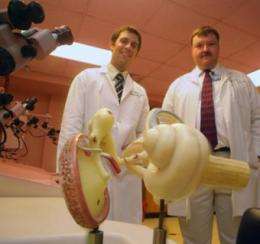Cochlear implants may be safe, effective for organ transplant patients

Cochlear implants may be a safe, effective option for some organ transplant patients who've lost their hearing as an unfortunate consequence of their transplant-related drug regime, researchers report.
The antibiotics and immunosuppressive drugs required by organ transplant patients can cause deafness, said Dr. Brian J. McKinnon, otologist and neurotologist at the Medical College of Georgia at Georgia Health Sciences University.
Antibiotics can destroy the finite number of dark cells in the inner ear. These cells produce the minute amount of fluid needed to help convert sound waves to neural impulses the brain can interpret. Apparently these dark cells are very metabolically active and antibiotics are designed to interfere with bacteria's metabolic activity.
"When you destroy the ability to make fluid, the system no longer functions," McKinnon said. Any sound patients may hear is incomprehensible.
Drugs that keep the immune system from attacking a transplanted organ can also leave the inner ear vulnerable to infection. In fact, cochlear implant patients typically get vaccinations to bolster their immune response to common infections since an electrode, connecting the device to the inner ear, can become a highway for bacteria and viruses. "If you do make the immune system work better, they may reject their organ," McKinnon notes.
Consequently, only a few transplant patients worldwide have gotten cochlear implants.
However, the new, small retrospective study provides more evidence that patients can restore their hearing without additional health risks if they wait at least six months after the organ transplant and take the right antibiotic before and after the cochlear implant procedure, McKinnon said. He and Dr. Kenneth C. Iverson, Chief Resident in otolaryngology at MCG, are co-authors of the study published in the American Journal of Otolaryngology. Two previous studies described experience with less than a dozen total patients.
The GHSU study focuses on two patients, including a 47-year-old woman who developed profound hearing loss five years after receiving a kidney from a living family member when a severe infection put her in intensive care and required several powerful antibiotics. She received a cochlear implant 18 months after the infection and six years after her transplant; her treatment included an intravenous antibiotic before the surgery and an oral antibiotic for a week afterward as well as continuation of her usual transplant-related medications. Her hearing was essentially normal 13 months later. She died two years after her implant from an unrelated health problem.
A 50-year-old man, who received a kidney from a deceased donor, experienced profound hearing loss six weeks after a severe brain infection. He received a cochlear implant seven months after his transplant and similar antibiotic therapy. About 75 percent of his hearing was restored 14 months later.
"This study adds to the growing evidence that successful cochlear implantation can be achieved in appropriately selected renal transplant patients," McKinnon and Iverson write. They have continued to use the device selectively in transplant patients and plan a larger, retrospective study.
Cochlear implants, which today are less than an inch in diameter, are placed behind the ear in between the scalp and skull. A short lead is inserted through the skull to the inner ear, located near the base of the brain. The devices are used in patients when other methods, such as traditional hearing aids, have failed. The device is costly and often not fully covered by private or federal health insurance, which has limited its use.
About 20 adults per 100,000 are deaf by the time they reach their senior years, primarily as a result of infections or repeated exposure to loud noise; 1-2 children per 1,000 are born with hearing loss.
















